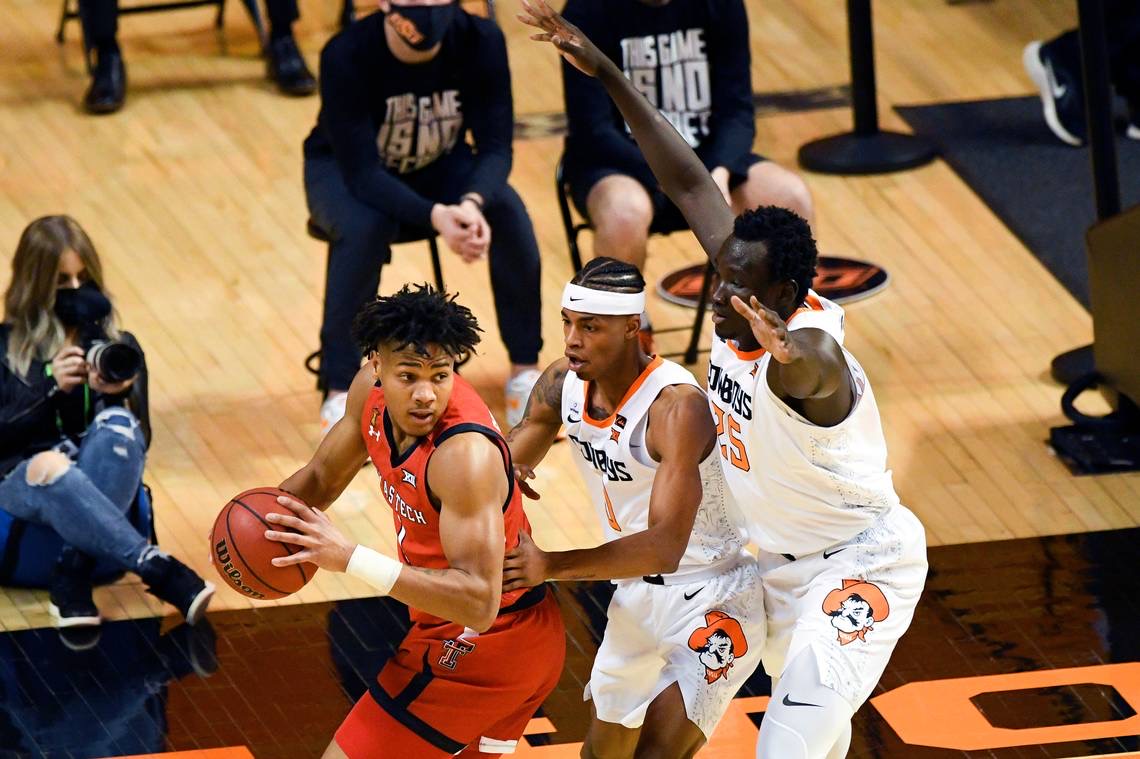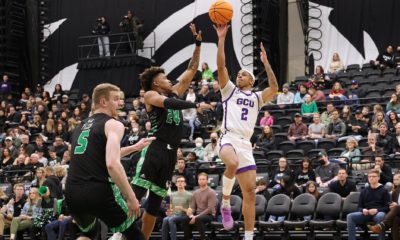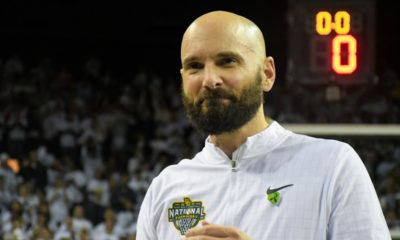
No, that isn’t a typo on the byline. The officiating was absolutely that biased. Multiple textbook charges in the game were inexplicably called blocks. Tech was whistled for nearly double the amount of fouls as Oklahoma State (24 to 13). It’s tough to talk about anything else, especially given the “mistake” on rewarding the Cunningham flop and allowing Oklahoma State three free throws to avoid the loss in the first matchup. This is beyond old. Both West Virginia and Oklahoma State were handed sweeps against TTU this year by officiating. Egregiously so. The officiating is either grossly incompetent or outright corrupt. There is no other explanation for games where one team can get doubled or nearly tripled up in free throw attempts.
Cade Cunningham committed his fourth foul with 16:48 left in the second half, and Tech would soon after see its lead grow to 11. It was looking extremely grim for the Cowboys, but the referees stepped in. Tech was whistled for 16 fouls after Cunningham went to the bench with his fourth, leading to 22 Oklahoma State free throw attempts. (The Cowboys, in this same time frame, were whistled for 3 whole fouls leading to 4 Tech free throw attempts.) Meanwhile, as if Oklahoma State coach Mike Boynton knew with a great deal of certainty that he could safely put Cade Cunningham back in the game with four fouls and around ten minutes left in regulation, Cade indeed played most of the rest of the game and overtime without ever being whistled for his fifth foul. Cunningham would ultimately score seven points while on that fourth foul, while everything the Texas Tech players did became a foul and Oklahoma State on the whole was allowed to do basically whatever they wanted.
There was a particularly appalling sequence of officiating in this when Clarence Nadolny had the ball. Oklahoma State bodied him multiple times until Clarence was knocked to the ground, and the bouncing ball caromed off the Cowboy player. Nadolny gets up and wants to know what gives, as he was fouled three separate times. Clarence immediately gets assessed his first career technical foul. What should have been free throws for Tech or at minimum retaining the ball instantly turned into two free throws for Oklahoma State and the ball. This play was fairly emblematic of what the rest of the game would be called. Even former UT coach Tom Penders weighed in accurately on this sequence of events.
As was the case in the first game, in a tie ball game with 30 seconds remaining, Oklahoma State found itself in a situation with the clock running down and decided to create contact and flail wildly. The Cowboy player was completely out of control, barely attempted a shot, and ran over a completely set Avery Benson who was well outside the circle. This was one of three blatantly obvious charges in the game in which Tech did not get the call. A whistle was blown on this one, but instead it was on Kyler Edwards for minimal arm contact on the “shot”. Ok St was given two free throws. Tech managed to answer with a score to fight its way into overtime. Oklahoma State would not be whistled for a foul in overtime at all, but Mac McClung would immediately be whistled for a pair of fouls. The second in particular was truly nonexistent, and again sent the Cowboys to the line to shoot a pair.
Tech certainly played well enough to win this game. Terrence Shannon, Jr. looked like his old self and was moving well and playing well. Terrence found Kyler Edwards for an amazing assist to send it to overtime, and had 18 points to go with three rebounds, an assist, and a steal. Kevin McCullar and Marcus Santos-Silva combined for 20 points, 16 rebounds, 2 assists, 4 steals, and 3 blocks. Mac McClung started slow, but eventually got it going and would post 17 points of his own. Kyler Edwards didn’t have a big scoring day, but played some incredible defense and posted 5 rebounds, 3 assists, and 3 steals. The bench contributions from Clarence Nadolny and Avery Benson were largely very good, save them both being victims of atrocious calls. It is worth noting that Benson somewhat botched a key breakaway in which he should have either passed it off or dunked it, but his effort on the floor was tremendous overall and he continues to deserve time. Micah Peavy had a quiet day, posting as many fouls as points, but can be forgiven for that considering the officiating. Tyreek Smith played quality defensive minutes.
All in all, it was the kind of effort one would expect to result in a Tech victory. Yet again, the officials prevented that from happening, and it isn’t even really in question. What transpired once the officials realized that Texas Tech was running away with the game with Cunningham in foul trouble was borderline criminal. It’s utterly indefensible when looking at the numbers. Again, 16 fouls to 3. 22 free throw attempts to 4. This isn’t some cherry-picked time frame; it’s an observation of how the officials called the late game to allow Oklahoma State to get back in and ultimately “win” the game. The numbers for the whole game aren’t much better. 32 free throw attempts to 12. 24 fouls to 13. It cannot be expressed how much of a blessing it will be to not play in front of Big XII officials soon. This felt like the officials wanting to send a message to Chris Beard after his justified tirade in the game against WVU. Referee Bert Smith off of that crew worked this game, and his cohorts in this one, Ron Groover and Doug Sirmons, worked the first game Tech played against West Virginia, which was also one of the worst-officiated games of the year.
It is also worth noting that the halves weren’t officiated in a consistent manner on the whole. Both teams drove the lane for much of the first half and few fouls were called on significant contact. In the second half, it was ticky-tack calls on minimal contact. In fact, it’s part of how Cunningham got in foul trouble, but Oklahoma State and Cade (as detailed above) were given the green light to do anything and everything once the referees realized they’d given Cunningham his fourth foul. Fran Fraschilla observed this change in the way the game was being called and noted that the players needed to “adjust” to it. Why? Why in the world should players have to adjust to whatever they think the officials will and won’t call this half and guess as to how to play to accommodate that? And how can one adjust to bias? If this isn’t a clear indication of a problem, it’s hard to fathom what is.
Apologies are due to the players for not giving them the spotlight that they deserve. They should be the story, good or bad, but instead it is once again the amateur, biased officials. Here is hoping that Texas Tech gets to write its own story in March.


















